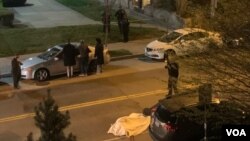The nighttime silence of a Washington, D.C., neighborhood was shattered by the sounds of rapid gunfire earlier this month. When police arrived on the scene, they discovered the lifeless body of an African American teenager, who had been shot and was lying in the street.
The April 11 killing of 15-year-old Malachi Jackson comes as many U.S. communities experience a wave of gun violence involving juveniles who are increasingly identified among the victims and the perpetrators.
D.C. Police say Jackson was the youngest victim and the third teen under age 18 to be killed by gunfire in the nation’s capital so far this year. His death has impacted many in the city’s Columbia Heights neighborhood where the young teen was killed.
“My son was not supposed to be murdered,” Jackson’s mother said in a television interview with NBC 4. “It just makes me wonder, do people even value anything anymore?”
No arrests have been made, but detectives believe the homicide may be the result of a neighborhood feud involving other young people.
“It is very alarming,” D.C. Police Third District Commander Han Kim said. “It’s very difficult for me to really express how concerning it is and how serious we take this.”
Officials in Washington have recorded more than 46 gun deaths this year, including the killings of two 16-year-olds in February and March.
“Gun violence here is out of control,” said Mary Rogers, who lives in Columbia Heights. She believes Jackson’s death was the third killing in the area involving a young person in the past six months.
“We need to get guns out of the hands of teenagers,” Rogers told VOA. “When juveniles get caught shooting someone and convicted in court, they should be severely punished.”
D.C. Mayor Muriel Bowser recently launched several citywide programs aimed at reducing gun violence and has proposed hiring hundreds of additional police officers.
“We need a 21st century model for police that seeks to prevent more crimes than just respond to them,” said Richard Aborn, president of the Citizens Crime Commission of New York.
“I’m talking about policing that seeks to understand what's driving gun crime or gang violence,” Aborn told VOA. “Police services need to ally with the community in getting government services into those neighborhoods throughout the country where it's most needed.”
Mass shootings
The tragedies of everyday gun violence, which account for most U.S. shooting deaths, are often overshadowed by reports of mass shootings, defined as four or more people being shot.
In Pittsburgh, Pennsylvania, two 17-year-olds were killed and several injured when officials said more than 90 shots were fired by multiple people inside a house party attended by 200 teenagers over the Easter holiday weekend.
Officials said one of the weapons used was an AR-15-style assault pistol.
“There are more illegal guns out on the streets than I have even seen before and there are many guns in the hands of juveniles,” Pittsburgh Police Chief Scott Schubert said in a CNN interview. “Gun violence is a national issue.”
According to the nonprofit Gun Violence Archive, nearly 21,000 U.S. gun deaths were reported in 2021. There were 693 mass shootings, claiming 702 lives.
Mass shootings have put many communities on edge with residents demanding more be done to reverse the trend. Several lawmakers in Congress have introduced legislation to prevent mass shootings and help communities where the violence occurred, but the legislation has stalled on Capitol Hill.
Curbing gun violence
U.S. President Joe Biden has prioritized combating gun violence and continues to press lawmakers to pass new gun laws. The measures would require background checks for all weapons purchases, a ban on assault weapons and high-capacity magazines, and a repeal of gun manufacturers’ protection from liability in shootings.
Gun rights advocates have vowed to fight hard against all the proposals, maintaining the measures infringe on the constitutional rights of gun owners.
President Biden has also proposed federal measures to restrict so called “ghost guns.”
“These guns are weapons of choice for many criminals,” Biden said during a White House event earlier this month. Ghost guns are sold in kits that consumers can assemble themselves.
Law enforcement officials said these guns are popular because they lack serial numbers, making them difficult for police to trace when the weapons are used to commit a crime.
The new government regulations would make it illegal for businesses to manufacture such kits without a serial number and for a licensed gun dealer to sell them without a background check.
The Justice Department says that in 2021, law enforcement agencies recovered about 20,000 suspected ghost guns during criminal investigations, 10 times as many as police found in 2016.
Police and government officials in Washington support efforts to crack down on the distribution of ghost guns and other programs to reduce gun violence.
“The crime we are grappling with now is the result of generations of hurtful policies that were perpetuated by racism and inequality, then exacerbated by insecurity caused by the pandemic and its aftereffects,” D.C. Ward 1 Councilmember Brianne Nadeau said.
In May, local leaders plan to launch a violence prevention program called “Cure the Streets” in the Columbia Heights neighborhood. It would utilize people entrenched in the community to help mediate disputes before they escalate into violence.
“The level of violence we have in this area is unacceptable to me and I will not rest until it subsides,” Nadeau said.




